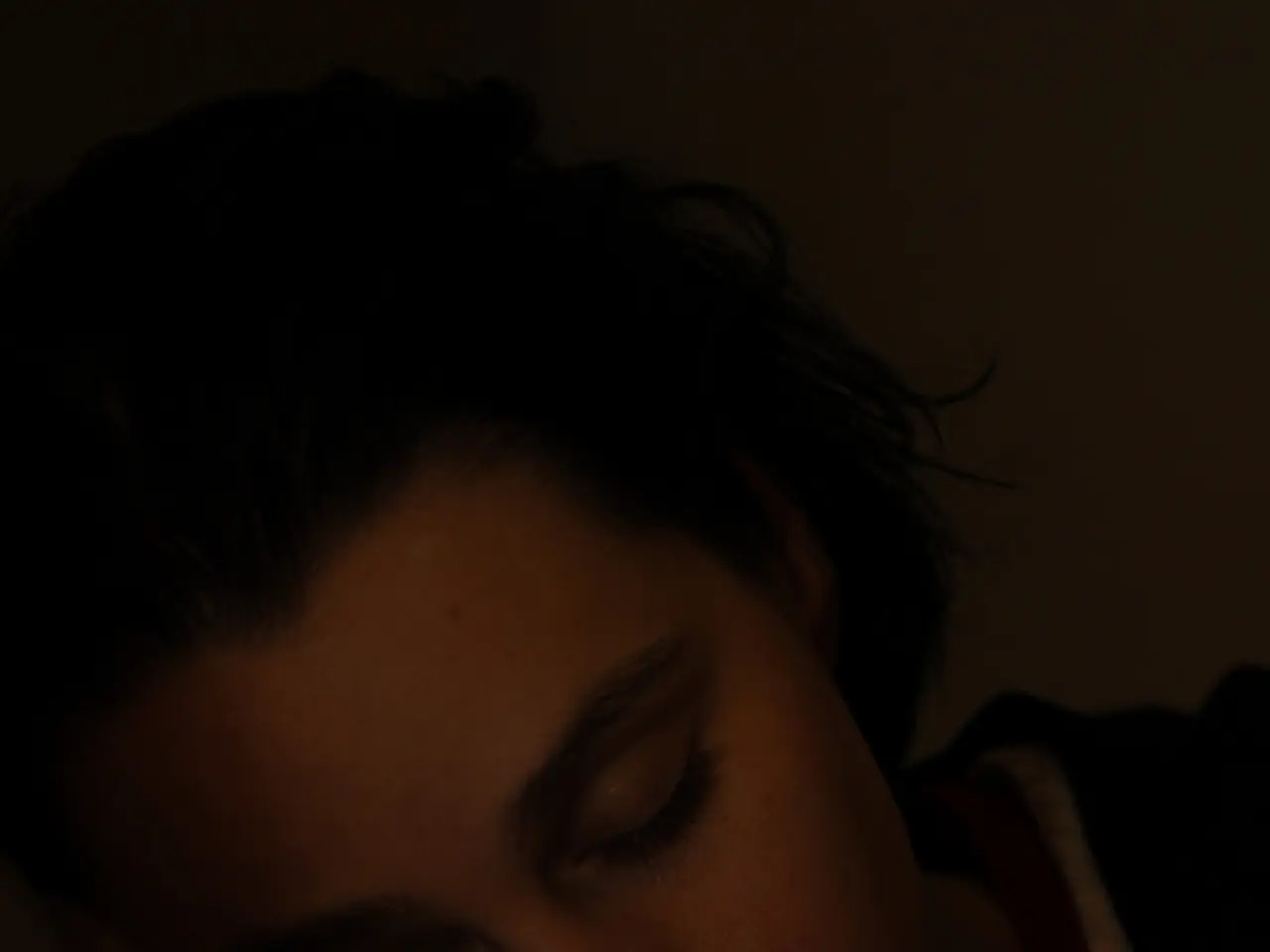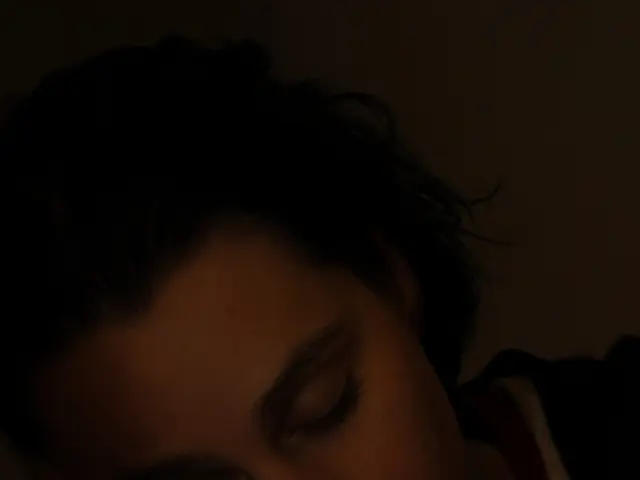Daily Wind Down for Sound Slumber: 6 Simple Strategies for Peaceful Rest
Get Your Evening Right for an Amazing Night's Sleep
Who says the morning routine gets all the attention? It's time to shake things up and focus on that all-important evening routine! Here's the 411 on how to wrap up your day and set yourself up for some serious shut-eye.
First off, forget the stress of those to-do lists and focus on the good stuff. Channel Benjamin Franklin's approach and reflect on the positive impact you've made throughout the day. Plus, it'll help leave you with a more positive and fulfilled mindset.
Now, instead of diving into dreamland as soon as your head hits the pillow, give your brain a chance to cool down (yes, really!). Research shows we need about 2 hours before lights out for our brains to truly unwind. Try classical music, meditating, journaling, or other calming activities to aid in this quick cool-down session. Steer clear of spicy foods too, as they can prolong the process.
It's time to clear your mind as well. Make a to-do list for tomorrow, so you can clear your brain to wind down. This will help protect those precious two hours before you hit the hay, and the two hours in the morning, making your mornings much smoother.
Ready for some superhero bedroom tips? Think of your bedroom like a cave - dark, cool, and quiet, the kind of environment your body craves for optimal sleep! Aim for a temperature between 65 and 72 degrees Fahrenheit.
Remember, everyone's different, so where Netflix might help one person's mind unwind, it could delay the sleep process for another. Experiment with what works best for you!
Now, let's get smart about it - there are tons of apps designed to help you sleep better. Sleep Cycle and HeadSpace are some of our faves. By using them, you can learn how to develop your very own perfect evening routine!
And hey, don't forget about blue light! Phones, computers, and other screens with blue light can disrupt sleep. Turn on settings that decrease blue light or use light fixtures with less blue light in the evening. Choose wisely!
So, there you have it - a toolkit to prepare for that glorious, deep, restorative sleep we all crave. Embrace your evening routine and watch your life transform into a well-rested, productive powerhouse!
PS: Have you tried creating a bedtime ritual yet? Think of something small and quirky, like sniffing lavender oil or giving your pillow a quick tap. Aim to make it a consistent part of your evening routine, and watch magic happen as your brain learns to clock out, faster than a torn-off page in a book. Sweet dreams!
Hacks for a Winning Bedtime Ritual:
- The Right Ritual: Pick something simple and comforting, like sniffing lavender oil or giving your pillow a quick tap. Make it yours!
- Pair It With Sleep: Do your special ritual right before hitting the hay for 10 nights in a row. Consistency is key!
- Keep It Solo: Don't mix it with other tasks - this helps reinforce its power as a sleep cue.
- No More Counting Sheep: Tweak the ritual if needed; find what works best for you.
Take charge of your evening routine, and get ready to kiss those sleepless nights goodbye!
Up Your Sleep Game: 50 Top Tricks (Naturally!)
Night-Night, Goodnight Routine: How to Develop a Hopeful, Happy Pre-Bed Process
Bedtime Bliss: The Ultimate Guide To an Astonishing Shut-Eye Experience
Evening Enchantment: Mastering Your Nighttime Magical Practices
Enrichment Data
A Comprehensive Guide for a Fulfilling Evening Routine
An effective evening routine can help you prepare for a restful night of sleep and bring a sense of peace and positivity to your life. Blending environmental, behavioral, and mental practices can create the optimal combination to wind down and sleep like a baby. Below are the best practices, synthesized from expert recommendations:
Best Practices for an Effective Evening Routine
1. Prepare Your Surroundings for Sleep
- Establish a tranquil sleep sanctuary: Keep your bedroom at a cool, dark, and quiet temperature. Use blackout curtains, comfortable bedding, and consider white noise machines when needed to block disruptive sounds.
- Limit technology in the bedroom: This helps your brain associate the room with sleep and improves sleep quality[1].
2. Synchronize Your Circadian Rhythms
- Maintain consistent sleep-wake times: Going to bed and waking up at the same time daily helps regulate your body's internal clock, making it easier to fall asleep and wake up refreshed[2][4].
- Get natural sunlight during daytime: Exposure to sunlight, especially in the morning, supports healthy circadian rhythms and better sleep at night[3][4].
3. Wind Down With Soothing Activities
- Dim the lights: Lower light helps signal your body to produce melatonin[3][5].
- Turn off electronic devices 30-60 minutes before bed: Blue light from screens interrupts melatonin production, making it harder to fall asleep[4][5].
- Engage in relaxing activities: Reading, listening to soothing music or audiobooks, or performing gentle yoga or stretching promotes relaxation[3][5].
- Take a warm shower or bath: Lowering your body temperature afterward aids in signaling your body to prepare for sleep[4].
4. Manage Your Mental and Emotional State
- Reflect on your day: Spend a few minutes acknowledging accomplishments and learning points, then focus on positive aspects or things you're grateful for[4].
- Write in a journal: Jotting down lingering thoughts or worries helps clear your mind and prevent rumination at bedtime[4].
- Plan for tomorrow: Write down your top priorities for the next day to reduce anxiety and mental clutter[4].
5. Avoid Stimulants and Disrupters
** Avoid caffeine and nicotine at least 6-8 hours before bed: These stimulants interfere with your ability to fall asleep[6].- Limit or avoid alcohol near bedtime: Alcohol may initially induce drowsiness but disrupts deep sleep phases later in the night[6].- Keep naps short and early in the day:* Napping too late or too long can reduce sleep drive at night[6].
6. Encourage Healthy Daytime Habits
- Exercise regularly but not close to bedtime: Physical activity promotes deeper sleep, but vigorous exercise should be finished a few hours before bed[6].
- Get natural light exposure in the morning: Supports circadian rhythm and improves sleep quality[6].
Summary Table of Key Evening Routine Components
| Aspect | Practice | Effect ||------------|-------------------------|------------------|| Environment | Peaceful sanctuary | Improves sleep quality || Schedule | Consistent routine | Regulates circadian rhythm || Pre-sleep | Calming activities | Increases melatonin, relaxes mind and body || Emotional | Mental wellbeing exercises | Positive mindset, reduces anxiety || Substance | Avoid stimulants and disruptors| Reduces sleep disruptions || Daytime | Healthy habits | Enhances sleep drive and quality |
Adopting these practices can create an effective evening routine that promotes both deep, restorative sleep and a positive mindset for the following day. Personalizing and being consistent with these habits are vital for long-term success[2][3][4][5][6].
- Incorporating tranquil activities into your evening routine can contribute to better health-and-wellness by promoting a restful sleep.
- Science suggests that calming activities such as journaling or meditation, if practiced an hour or two before bed, can help reset the brain for a night of healthy sleep, contributing to overall wellness and lifestyle.








